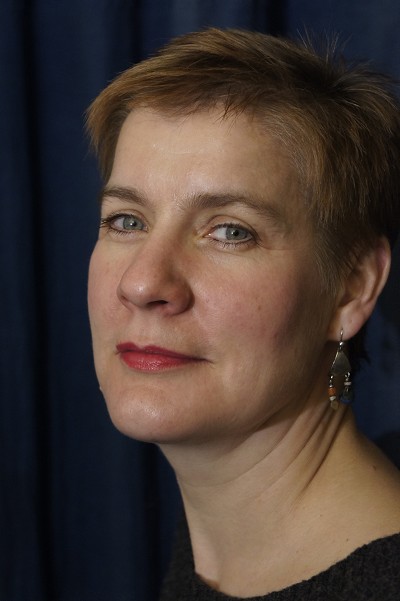Tanya Landman
Tanya Landman is a prolific and renowned British writer. She studied English literature at the university and became a writer in 1992.
In the book’s introduction of her [The World’s Bellybutton], she is quoted as saying: “I’ve always loved the Greek myths and one morning I was thinking about the gods. Being immortal they can’t have just died out when people stopped believing in them. I started wondering what had happened to them and where are they now. The World’s Bellybutton is the result.”
Source:
Official website (accessed: September 10, 2019)
Bio prepared by Ayelet Peer, Bar-Ilan University, ayelet.peer@gmail.com
Questionnaire
1. What drew you to writing/working with Classical Antiquity and what challenges did you face in selecting, representing, or adapting particular myths or stories?
I’ve loved the Greek myths since I encountered them in primary school. I have a very vivid memory of being told the story of the Cyclops for the first time, listening wide-eyed and terrified by the ghastly one-eyed man-eating monster, then being overawed at Odysseus’s ingenuity in outwitting him. After that I devoured as many tales of gods, monsters and heroes as I could get my hands on. But there was always something about Odysseus – who relied on human wit and intelligence rather than divine parentage – that I found particularly appealing. When I started writing, I wanted to do something that involved the Greek myths but I wanted it to have a contemporary setting. I reasoned that if the gods were immortal, they must still be around but with no one worshipping them they’d be fairly fed up about the state of the modern world. The idea amused me and The World’s Bellybutton started to take shape in my head.
2. Why do you think classical/ancient myths, history, and literature continue to resonate with young audiences?
On a superficial level – with gods, monsters, flying horses, heroes with super powers, the Greek myths have got it all!
But on a deeper level I think what appealed to me as a child was the capricious nature of the gods. As a child you’re not in control of your own life – everything is dictated by parents/teachers/other god-like adults. They are all powerful and their reasoning is completely incomprehensible to a child. So I really understood the idea that if you were human your life was steered by forces beyond your control. And the world view in the Greek myths actually seemed to make more sense to me than the Christian one. At school, I was told that God is just and loving and yet no one could explain why he allowed dreadful things to happen to good people. I found it baffling. Yet with the Greek myths being moral or immoral, well behaved or not didn’t seem to matter. What made a difference to your fortune was whether a particular god liked you or not. A god could lift you up and then cast you down just as easily. It wasn’t fair, or just or deserved – it was just the way it was. And that was an accurate reflection of the world I saw around me.
3. Do you have a background in classical education (Latin or Greek at school or classes at the University?) What sources are you using? Scholarly work? Wikipedia? Are there any books that made an impact on you in this respect?
I did English Literature at university and that involved reading Greek and Roman mythology (in translation).
4. Did you think about how Classical Antiquity would translate for young readers, esp. in (insert relevant country)?
I think most children’s writer write for the children they once were. I was telling the tale that would have amused me at 9 or 10 years old.
5. How concerned were you with "accuracy" or "fidelity" to the original? (another way of saying that might be – that I think writers are often more "faithful" to originals in adapting its spirit rather than being tied down at the level of detail – is this something you thought about?)
Yes – absolutely. It’s very easy to get bogged down in detail and lose the spirit of the story. I was more concerned about creating an exciting adventure than writing something "authentic."
6. Are you planning any further forays into classical material?
Not in the immediate future, but I wouldn’t rule it out.
Prepared by Ayelet Peer, Bar-Ilan University, ayelet.peer@gmail.com
Records in database:



